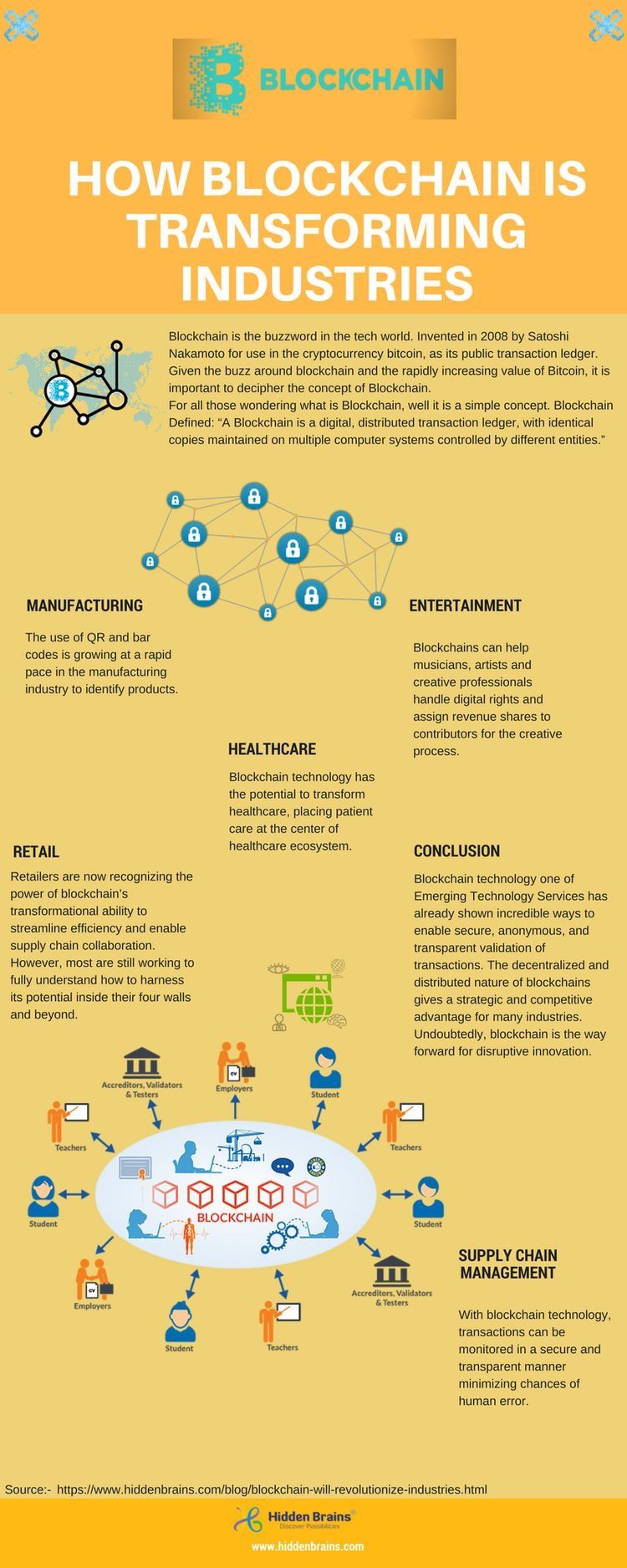HOW BLOCKCHAIN WILL REVOLUTIONISE INDUSTIRES

Blockchain is the buzzword in the tech world. Invented in 2008 by Satoshi Nakamoto for use in the cryptocurrency bitcoin, as its public transaction ledger. Given the buzz around blockchain and the rapidly increasing value of Bitcoin, it is important to decipher the concept of Blockchain.
For all those wondering what is Blockchain, well it is a simple concept. Blockchain Defined: “A Blockchain is a digital, distributed transaction ledger, with identical copies maintained on multiple computer systems controlled by different entities.”
“The blockchain is an incorruptible digital ledger of economic transactions that can be programmed to record not just financial transactions but virtually everything of value.” Don & Alex Tapscott, authors Blockchain Revolution (2016).
How Does Blockchain Work?
Blockchain is a distributed peer-to-peer network which records transactions and assets on a business network. A block is a record of new transactions. Each block typically contains a cryptographic hash of the previous block, a timestamp and transaction data. Once each block is completed, it is added to the chain, creating a chain of blocks: a blockchain.
Blockchain is "an open, distributed ledger that can record transactions between two parties efficiently and in a verifiable and permanent way". Many experts consider Emerging Technology Solutions such as Blockchain an effective alternative to conventional banking where users can eliminate the need of financial institutions to transfer money.
Size of the blockchain technology market worldwide from 2016 to 2021 (in million U.S. dollars)
According to statistic, the market for blockchain technology worldwide from 2016 to 2021. In 2017, the global blockchain technology market is predicted to reach 339.5 million U.S. dollars in size and is forecast to grow to 2.3 billion U.S. dollars by 2021.
Here is how Blockchain is Transforming Industries
Retail
Retailers are now recognizing the power of blockchain’s transformational ability to streamline efficiency and enable supply chain collaboration. However, most are still working to fully understand how to harness its potential inside their four walls and beyond.
For retailers, blockchain holds the promise of delivering trust in a product, transaction or the integrity of data more effectively and at lower cost than ever before. Blockchain applications could help retailers improve supply chain visibility, ensure product provenance and authenticity, speed up transactions, reduce processing fees, and improve the management of networked loyalty programs.
Healthcare
Blockchain technology has the potential to transform healthcare, placing patient care at the center of healthcare ecosystem. The ultimate aim of blockchain technology is to increase the security, privacy, and interoperability of health data by making electronic medical records more efficient and secure.
Manufacturing
The use of QR and bar codes is growing at a rapid pace in the manufacturing industry to identify products. However, these methods can be challenged because of security concerns. Blockchain-enabled smart contracts will eliminate the need of middleman allowing negotiation of terms such as price, quality level and delivery.
Supply Chain Management
With blockchain technology, transactions can be monitored in a secure and transparent manner minimizing chances of human error. This decentralized ledger can be used to monitor costs, labour, and even wastage and emissions at every point of the supply chain, as well as verify the authenticity of products from point of origin.
Entertainment
Blockchains can help musicians, artists and creative professionals handle digital rights and assign revenue shares to contributors for the creative process. Smart contracts can revamp the conventional contracts, which provide artists little power to clients to revamp the terms and conditions for the content generated. Royalties could be designed to be more inclusive, offering fairer terms for composers, lyricists, and musicians—all stakeholders involved in the creative process.
Several Blockchain-based platforms are focused on helping creators raise money from their fans, these platforms are still in the middle as a facilitating platform.
Blockchains are good platforms for creative professionals to showcase their content directly to consumers and be paid without the introduction of middle-men or third parties like Producers or streaming platforms which cuts off a sizable portion of the revenue.
Conclusion
Blockchain technology one of Emerging Technology Services has already shown incredible ways to enable secure, anonymous, and transparent validation of transactions. The decentralized and distributed nature of blockchains gives a strategic and competitive advantage for many industries. Undoubtedly, blockchain is the way forward for disruptive innovation.